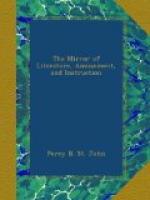of Tothill-fields. Breeches, rejected by common
consent of young and old alike, cling to the legs of
the coalheaver with an abiding fondness, as to the
last place of refuge; and, on gala-days, a dandy might
die of envy to mark the splendour of those nether
integuments—which he has not soul enough
to dare to wear—of brilliant eye-arresting
blue, or glowing scarlet plush, glittering in the
sun’s rays, giving and taking glory! But
enough of the dress of these select “true-born
Englishmen”—for right glad I am to
state that there are but two Scotch coalheavers
on the whole river, and no Irish. I beg
leave to return to the more important consideration
of their manners. Most people you meet in your
walks in the common thoroughfare of London, glide,
shuffle, or crawl onward, as if they conscientiously
thought they had no manner of right to tread the earth
but on sufferance. Not so our coalheaver.
Mark how erect he walks! how firm a keel he
presents to the vainly breasting human tide that comes
rolling on with a show of opposition to his onward
course! It is he, and he only, who preserves,
in his gait and in his air, the self-sustained and
conscious dignity of the first-created man. Surrounded
by an inferior creation, he gives the wall to none.
That pliancy of temper, which is wont to make itself
known by the waiving a point or renouncing a principle
for others’ advantage, in him has no place;
he either knows it not, or else considers it a poor,
mean-spirited, creeping baseness, altogether unworthy
of his imitation, and best befitted with ineffable
contempt. He neither dreads the contact of the
baker—the Scylla of the metropolitan peripatetic,
nor yet shuns the dire collision of the chimney-sweep—his
Charybdis. Try to pass him as he walks leisurely
on, making the solid earth ring with his bold tread,
and you will experience more difficulties in the attempt
than did that famous admiral, Bartholomew Diaz, when
he first doubled the Cape of Storms. Or let us
suppose, that haply you allow your frail carcass to
go full drive against his sturdiness, when lo!—in
beautiful illustration of those doctrines in projectiles,
that relate to the concussion of moving bodies—you
fly off at an angle “right slick” into
the middle of the carriage-way; whence a question
of some interest presently arises, whether you will
please to be run over by a short or a long stage.—But
to return. Who hesitates to make way for a coalheaver?
As for their drays—as consecutive
a species of vehicles as a body can be stopped by—every
one knows they make way for themselves.
I one Sunday met a party of my favourites in St. Paul’s cathedral. They seemed to view with becoming respect and even awe that splendid place; and they listened to and observed, with apparent profound attention, the cathedral service. Yet I must confess my favourable opinion of their grave looks was rather staggered by overhearing afterwards one of them say to his neighbour, casting a look all round the while, “My eyes, Tom, what lots o’ coals this here place would hold.” Perhaps the observation was meant in honour.




